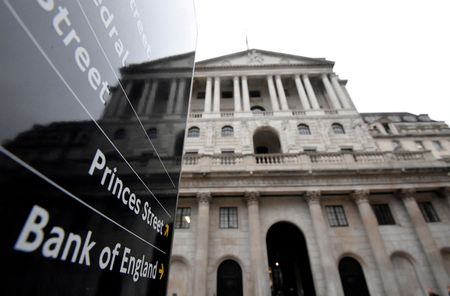By Andy Bruce and David Milliken
LONDON (Reuters) -The Bank of England raised interest rates to 0.5% on Thursday and nearly half its policymakers wanted a bigger increase to contain rampant price pressures, which the British central bank warned would push inflation above 7%.
In a surprise split decision, four of the nine Monetary Policy Committee members wanted to raise rates to 0.75% in what would have been the biggest increase in borrowing costs since the BoE became operationally independent 25 years ago.
A slim majority, including Governor Andrew Bailey, voted for a 0.25 percentage point increase.
The pound briefly jumped above $1.36, its highest level since Jan. 20, and touched a two-year high against the euro before falling back after the European Central Bank raised the possibility of a rate hike of its own.
British government bonds sold off, with the 10-year yield at its highest since January 2019.
The BoE, which in December became the first major central bank to raise rates since the pandemic, flagged further modest tightening “in the coming months” even though growth will be hurt by global energy and goods price inflation.
But Bailey told investors not to assume the BoE was embarking on a long series of rate hikes, and said there would have to be a trade-off between strong inflation and weakening growth as many households see their incomes squeezed.
Earlier, finance minister Rishi Sunak detailed measures to help households cope https://www.reuters.com/world/uk/uks-sunak-sets-out-financial-support-help-with-energy-bills-2022-02-03 with a leap in energy prices in April, when taxes for workers and firms are due to rise.
Bailey said he had a “hard message” for the public.
“We have not raised interest rates today because the economy is roaring away,” he told reporters. “An increase in Bank Rate is necessary because it is unlikely that inflation will return to target without it.”
Britain was facing an “extreme example” of an economic shock that would raise the cost of living for everyone, Bailey warned.
Some analysts said the BoE risked adding to the financial pain.
“We think that they are effectively cracking a supply side nut with a demand side hammer,” Richard McGuire, head of rates strategy at Rabobank, said.
James Athey, investment director at abrdn, said inflation expectations in financial markets were little changed by the BoE’s announcement.
“The Bank seemingly cannot win in such a scenario as the market is essentially saying that if they don’t create a recession then inflation won’t come down far enough,” he said.
Thursday’s move marked the first back-to-back increases in Bank Rate since 2004.
After the BoE’s announcement, investors priced in Bank Rate hitting 1.0% by May and 1.5% by year-end.
“It would not be surprising if we see a further increase, but please don’t get carried away,” Bailey said.
SPLIT DECISION
The BoE said consumer price inflation – which was 5.4% in December – should peak at around 7.25% in April, which would be the highest rate since the recession-ravaged early 1990s and miles off its 2% target.
High inflation meant post-tax income for working households would fall by 2% this year and 0.5% next year, while weakening demand would push unemployment up to 5% in three years’ time.
The BoE said it will start to unwind its 895 billion pound ($1.2 trillion) quantitative easing programme by allowing the government bonds it holds to roll off its balance sheet as they mature. It will sell its much smaller stock of corporate bonds.
Price pressures look set to persist for much longer than forecast in November by the BoE, which trebled its forecast for wage growth this year to 3.75%.
Inflation in a year’s time is now seen above 5% based on the market outlook for interest rates.
But in a sign the BoE thinks investors have priced in too many rate hikes, it predicted inflation in three years’ time would be below target at around 1.6%.
Bailey, his deputies Ben Broadbent and Jon Cunliffe, Chief Economist Huw Pill and external MPC member Silvana Tenreyro all voted for a 25 basis-point rate hike.
The BoE said they recognised the risks of strong price pressures but also the potential for inflation to fall faster if global energy and goods costs ease as markets expect.
They warned a larger rate hike could have an “outsized impact” on expectations for borrowing costs.
Deputy Governor Dave Ramsden and external members Michael Saunders, Jonathan Haskel and Catherine Mann voted for a half-percentage-point rate rise to reduce the risk that recent pay growth and inflation expectations became more firmly embedded.
BOND SALES
The BoE said the unwinding of its asset purchases would start next month when a British government bond held by the central bank matures. The 27.9 billion pounds of proceeds will not be reinvested, the BoE said – and nor will future gilt redemptions, worth around 70 billion pounds over 2022 and 2023.
The BoE will consider actively selling gilts once Bank Rate hits 1%.
It said it plans to reduce its 20 billion pounds of corporate bond holdings to zero no sooner than end-2023, by not reinvesting maturing bonds and a sales programme.
(Reporting by Andy Bruce; Editing by Catherine Evans, William Maclean)











